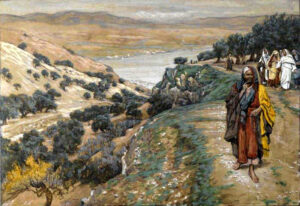Twentieth Sunday after Pentecost
READINGS FOR THE COMING WEEK
- First reading and Psalm
- Job 23:1-9, 16-17
- Psalm 22:1-15
- Alternate First reading and Psalm
- Amos 5:6-7, 10-15
- Psalm 90:12-17
- Second reading
- Hebrews 4:12-16
- Gospel
- Mark 10:17-31
The gospel from Mark:
As Jesus was setting out on a journey, a man ran up and knelt before him, and asked him, “Good Teacher, what must I do to inherit eternal life?” Jesus said to him, “Why do you call me good? No one is good but God alone. You know the commandments: ‘You shall not murder; You shall not commit adultery; You shall not steal; You shall not bear false witness; You shall not defraud; Honor your father and mother.'” He said to him, “Teacher, I have kept all these since my youth.”

James Tissof: 1886-1896:
Watercolor Brooklyn Museum
New York, NY
*see note below.
Jesus, looking at him, loved him and said, “You lack one thing; go, sell what you own, and give the money to the poor, and you will have treasure in heaven; then come, follow me.” When he heard this, he was shocked and went away grieving, for he had many possessions.
Then Jesus looked around and said to his disciples, “How hard it will be for those who have wealth to enter the kingdom of God!” And the disciples were perplexed at these words. But Jesus said to them again, “Children, how hard it is to enter the kingdom of God!
It is easier for a camel to go through the eye of a needle than for someone who is rich to enter the kingdom of God.” They were greatly astounded and said to one another, “Then who can be saved?” Jesus looked at them and said, “For mortals it is impossible, but not for God; for God all things are possible.”
Peter began to say to him, “Look, we have left everything and followed you.” Jesus said, “Truly I tell you, there is no one who has left house or brothers or sisters or mother or father or children or fields, for my sake and for the sake of the good news, who will not receive a hundredfold now in this age–houses, brothers and sisters, mothers and children, and fields with persecutions–and in the age to come eternal life.
But many who are first will be last, and the last will be first.”
Sermon
Jesus said to his disciples that it is easier for a camel to pass through the eye of a needle than for a rich man to enter Heaven. In a word, impossible. They ask him who can be saved. Jesus answers that all things are possible for God. We are like the rich man, for whom all things are possible. Here is a basic contradiction. Pastor Stevensen tells us that our hymn of the day has for lyrics the words of a poem written by Charlotte Elliot, a woman in poor health. She let God work through her when she wrote the words “Just as I am, Lord, ….. ,” a hymn that appears in many collections. Jesus loved the rich man, who was disappointed, but did not need to follow Jesus. He could depend on God. Charlotte Elliot depended on God. Pastor continues, saying that a dependence on God is not a weakness ……!
*Note: “…when Tissot carefully researched collection of 350 watercolors depicting the life of Jesus was first published as a book in 1896, it found a large and enthusiastic audience. No one who had followed his previous career could have anticipated that this painter of urban life in Paris and London would undertake the project of painting virtually every event in the Gospels.
The Life of Our Lord Jesus Christ project took nearly ten years to complete. When it was done, it chronicled the entire life of Jesus as recorded in the New Testament in a series of 350 watercolors. To research the project Tissot traveled to Egypt, Syria, and Palestine in 1886–87, and again in 1890.
While in the Holy Land he closely observed the landscape, the vegetation, the architecture, and the manner of dress, and filled sketchbooks with what he saw. He talked with rabbis and studied Talmudic literature as well as theological and historical volumes. He believed that there was still a remaining “aura” in the places where the Gospel events took place, and he spoke of having mystical experiences that added to his careful research. What he wanted to create was something as close as possible to an eyewitness account of the life of Jesus.” [from Terry Glaspey’s “75 Masterpieces Every Christian Should Know”])

